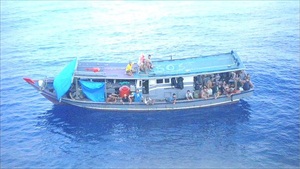Michael Bachelard – May 17, 2013 |
- Note to the reader: There are between 1.5 to 2.5 million Hazaras that live in Iran. At times it is difficult to ascertain the identity of the individuals.
Two more would-be asylum seekers have died on the ocean trying to get to Australia while their 46 shipmates survived a boat journey that contained equal parts tragedy and luck.

The survivors, among them five children under six years old, endured 10 days without power, food or fresh water before they were spotted by an Border Protection Command plane and rescued by a cargo ship.
But two days before the rescue, two men, Sajad and Meisam, had decided to paddle out to look for help. They constructed a raft from empty fuel containers and spare wood, and their paddle was a length of timber from the boat. They were never seen again.
”They had family in Iran,” Benyamin Saber, one of the survivors, tells Fairfax Media as his wife, Maryam, sobs.
”They are family to my friends and the family has called already and asked if they are OK, but we don’t know. They risked their life because of us, looking for the help.”
The 46 who survived — 29 men, 12 women and five children, all Iranians — now face an uncertain future in Indonesia’s overcrowded immigration detention system.
Saber says the group paid $US5000 each to an Indonesian people smuggler he knew as ”Reza”, and set off from an unknown location in Central or Eastern Java on about April 27. But 30 hours later, the engine on the wooden fishing boat stopped, rendering the pumps useless.
There was no navigation system, no communications and no life jackets.
They had to bail out the water by hand.
After two more days, the crew abandoned ship, swimming to other fishing boats in the area, which refused to help the Iranians.
”We waved our hands and they ignored us . . . We don’t go on ships in Iran. Nobody had any idea [what to do].
”We were full of distress, pressure . . . didn’t know anything about the ship, the sea . . . There was no sleep, just sailing, and the women screaming and the children crying.
Believe me, we experienced a harmful condition,” Saber says.
They boiled salt water and captured the steam to drink but there was not enough, and the noodles packed by the crew ran out in the first two days.
”Most of us were crying, most have the sunburn, vomiting and low glucose, most ill.”
On the tenth day, May 7, they saw an Australian surveillance aircraft overhead and about two hours later, cargo ship Aeolos arrived.
Dan Posadas, the chief officer in charge of the rescue on Aeolos says the refugees’ wooden boat was ”submerged dangerously because of flooding water”.
The crew plucked them off in a 200-litre plastic drum, ”heaving up [the refugees] one by one — the safest way because of the sea condition, and because most of them were tired, weak, dizzy, nervous,” Posadas said.
According to AMSA, the group was picked up 110 nautical miles north of Christmas Island. But the Aeolos was sailing to Indonesia, so that’s where the group went.
Fairfax Media spoke to them in a hotel in the port of Merak where they were under lock and key all day, with only brief respite while their rooms were cleaned.
Narges, one of the women, said they had fled Iran to find a place ”with human rights”.
”They never let us as women speak or be free,” she said. ”There are no rights for women . . . every place when women want to speak and defend herself, immediately they say you shouldn’t; let your husband speak about it.”
Australia may not want them, but their awful story affected one man, at least. Dan Posadas, the man in charge of rescuing them, signed off one communication with Fairfax Media saying: ”I wish all your efforts and your goodness in the near future to read in the newspaper [that] these people reach their dreams comes true.”
[ Full story on Sydney Morning Herald, Australia ]
admin
Latest posts by admin (see all)
- ISIS claims gruesome murder of 10 Hazara coalminers in Pakistan - January 5, 2021
- Farewell Hussain Babai - December 20, 2020
- Hazaras categorically reject US-engineered ‘Taliban talks’ in Qatar - September 12, 2020